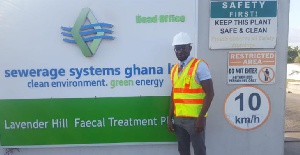 MacLean MacSarbah, Graduate Student at Harvard University
MacLean MacSarbah, Graduate Student at Harvard University
It was Margaret Mead who once said, “Never doubt that a small group of thoughtful, committed citizens can change the world.”
For many people, this remains mere rhetoric until the reality of meeting one such individual brings that home. For me, a firsthand experience of the children of Dr. Agyepong’s mind, the products of his endeavours and the materialization of his inventive genius, I must say, bore that out.
In January 2018, I was in Merida in the Yucatan Peninsula of Mexico for a class on “Social and Sustainable Innovation Driven by the Sustainable Development Goals.” It was organized by the Harvard School of Public Health and universities in the Yucatan peninsula. Sessions were taught by renowned faculty from Harvard University, local Yucatan universities and research centers across the peninsula.
This yielded a hefty payload in terms of enriching my knowledge of social entrepreneurship and innovation, United Nations’ Sustainable Development Goals (SDGs), and the process of creating startups to help in achieving the SDGs. To augment my knowledge of social innovation and entrepreneurship in Africa, I took a class, this past spring, on “Entrepreneurship in Africa” at Harvard University.
In this class, we delved into the nitty-gritty of social entrepreneurship as a conduit to overcoming Africa’s social, economic and environmental challenges. I was exposed to the literature on entrepreneurship in Africa, the critique of the oft-patronized aid approach by the Western world in their attempts at helping African countries free themselves from the shackles of poverty and underdevelopment. We added a wrinkle to what has become a sort of cause célèbre: the invasion of the African business terrain by the Chinese. We know that the aid approach hasn’t struck the cards our way in terms of absolute freedom from underdevelopment.
Despite bringing in its wake some successful projects on the African continent, the Chinese invasion has had its fair share of criticisms viz., human rights abuses, lack of respect for environmental safety, and, in many cases a preference for Chinese labour force over their African counterparts on projects being undertaken on African soil.
The magnitude of Dr. Siaw Agyepong’s inventions gives credence, no less doubtfully, to the monumental importance he assigns to subverting this narrative and to make a social impact, finding solutions to environmental problems, creating jobs, contributing to economic growth and, over the long pull, playing a part in achieving the SDGs.
As a Ghanaian living abroad, I had heard about the great work Dr. Agyepong was doing. It didn’t quite sink in until I had a chance to tour his waste management facilities in Ghana. While waiting to be picked up for the tour, I had a bit of a sugar-rush. If I have the pluck to chime in with thoughts, which might put a few noses out of joint, I must say that the work he is doing is so important that anyone with a fraction of understanding of how central this is to overcoming Ghana’s sanitation challenges, environmental pollution, job creation, achieving the SDGs, etc., will have no grumbles.
To put it bluntly, my visit to the Accra Compost and Recycling Plant Limited (ACARP), a novel initiative of its ilk, shed light on the importance of the operations of this plant which collects, sorts and recycles waste into organic manure for farming and other agricultural purposes. I also had the chance to visit Zoompak, an ultra-modern waste disposal transit station in Accra. I drew the curtain on the day with a visit to Sewerage Systems Ghana Limited, a faecal treatment plant in Accra, which treats massive tons of faecal and liquid waste.
Quite frankly and rightly so, I can’t imagine what Ghana will look like without the work of Dr. Siaw Agyepong. The ripple effect of waste management, which finds its fullest expression in job creation, environmental safety and, as a buffer against food security, by providing organic manure for farming, reflects the creative muscles of this man, and provides a compelling reason to commend his work. Even more important is the treatment of fecal waste which, hitherto, was being dumped into the sea.
The foregoing discussion doesn’t even exhaust the length and breadth of the impact of his work on Ghana’s waste and sanitation challenges. This anchorage to social entrepreneurship as a solution to social and environmental challenges is, certainly, par for the course and, knitting things together, recasts the legacy he is creating and, for once, not someone just paying mere lip service to Mead’s wisdom.
Dr. Agyepong is in the vanguard of social entrepreneurs making an impact in Ghana and deserves a commensurate mention.